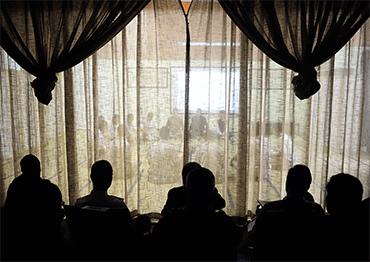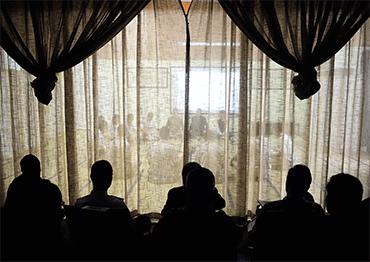A new draft amendment of China’s Criminal Law to lower the age of criminal liability from 14 to 12 was submitted to the National People’s Congress (NPC), China’s top legislature, on October 13. The amendment stipulates that juveniles between 12 and 14 can be held criminally responsible if they are convicted of intentional homicide or deadly assault, though they would not be tried as an adult.
The amendment is in response to a public outcry over a string of violent cases perpetrated by juveniles who were given what people saw as lenient sentences. Among those garnering nationwide attention was the case of a 13-year-old boy who murdered a 10-year-old girl last year in Dalian, Northeast China’s Liaoning Province. According to reports, the boy killed her after an attempted rape and disposed of her body in the bushes of their shared residential community. The boy was tried as a juvenile and sentenced to three years of criminal detention.
The move has raised debate. During deliberations over the amendment in July, Feng Jun, a member of the Standing Committee of the NPC and former law professor at the Chinese Academy of Social Sciences, claimed that many among the public and judicial officials want to lower the juvenile criminal liability age, the Beijing Youth Daily reported.
In a proposal on curbing violence among minors submitted during this year’s annual legislative meetings in May, the central committee of the China Association for Promoting Democracy argued that China’s Criminal Law has attracted public criticism because it is too weak on juvenile crime.
But according to a research paper on juvenile violence by He Xin, a judge presiding at Changning District People’s Court in Shanghai, most legal scholars are reluctant to recommend lowering the age of criminal liability before conducting further research, while some said there is a lack of evidence that juvenile violence is increasing.
According to a white paper issued by the Supreme People’s Procuratorate (SPP) in June 2020, cases involving drug trafficking, school bullying and violent crime among 14- to 16-year-olds declined between 2014 and 2019.
Pi Yijun, director of the Juvenile Delinquency Research Center affiliated with the China University of Political Science and Law in Beijing, said there is no evidence showing that delinquency rates among juveniles are greater than among adults, and that lowering the criminal liability age is unlikely to have the desired effect. “There should not be a rush to make sweeping judgements based on a few violent juvenile cases,” he told NewsChina. Some legal scholars and lawyers expressed concerns that imposing severe penalties on minors would do more harm than good by negatively affecting their developmental health.
Fang Yan, deputy director of Shaanxi Provincial Lawyers’ Association, told our reporter that incarcerating juveniles during a crucial time in their cognitive development could reinforce criminal tendencies. “It doesn’t help prevent crime and it makes juvenile offenders more likely to commit crimes again,” she said.
Some legal scholars support lowering the minimum age, saying that children and teens are maturing faster than previous generations and that China’s Criminal Law should reflect the changing times.
In 2017, China’s General Principles of Civil Law lowered the minimum age of limited capacity for civil conduct, such as for contractual obligations and payment transactions, from 10 to 8 years old. Meanwhile, the Security Administration Punishment Law lowered the minimum age for administrative detention from 16 to 14.
Some legal scholars have advised a more centric approach by appealing to the doctrine of “malice supplies the age” from English common law. Specifically, an offender below the age of 14 would be tried as an adult provided there is adequate evidence of their ability to distinguish right from wrong.
In their proposal delivered at the two sessions, China’s top legislative meetings, the China Association for Promoting Democracy pointed out that some juveniles show no fear of legal retribution due to China’s rigid criminal liability age. For example, in the high-profile murder case in Dalian, the 13-year-old boy told authorities he was aware he would not be held criminally accountable because he was under 14, media reported.
Guo Kaiyuan, director of the Juvenile Law Institute at China Youth and Children Research Center, told NewsChina that minors under 14 should only be held criminally liable for serious crimes.
“These kinds of cases are rare, but they do happen. There are loopholes in the law which should be amended. The draft amendment is heading in this direction,” he said.
According to China’s Criminal Law, juveniles between 14 and 16 bear criminal responsibility with leniency for eight crimes: intentional homicide, aggravated assault resulting in death, rape, robbery, drug trafficking, arson, bombing and poisoning. The criminal liability age of 14 was set in 1997.
Guo argued for criminal sentences for minors between 12 and 14 who commit serious violent crime such as intentional homicide and deadly aggravated assault. He added that most high-profile cases committed by minors involve these two crimes.
“It would be inappropriate, however, to expand the range of penalties for juveniles [of this age group],” he said.
During the amendment review, legislator Chen Sixi argued that death should not be the determining factor for criminal accountability. In cases where victims are badly disfigured or comatose, he added, exempting offenders from criminal liability would be unjust.
The draft amendment also seeks to require correctional education for juvenile justice. Zhang Tiewei, a spokesperson for the top legislature’s Legislative Affairs Commission, said in a news conference in late October that the amendment also aimed to improve correctional education.
Yuan Ningning, an associate professor at the China University of Political Science and Law, told NewsChina that criminal responsibility for 12- to 14-year-olds would be decided on a case-by-case basis by the SPP. Those within the age group not found criminally liable could receive correctional education.
The most severe penalty in China for minors under 18 is serving up to three years at a juvenile correctional center. Feng Jun, a member of the Standing Committee of the NPC, pointed out three major issues with the current system: the roles of law enforcement, schools and courts are not clearly defined, a lack of top-level implementation, and correctional facilities need improvement.
Pi Yijun called for expert panels to individually evaluate juvenile cases involving violent crime. The panels should include members of law enforcement, prosecutors and the courts, as well as experts in education, mental health, teachers and social workers.
“A detailed investigation and evaluation of motive is necessary for each juvenile offender before a report is completed,” he said. “The court should base its ruling on the report and provide an individual correctional plan.”
Pi added that most lawyers and prosecutors never receive specialized training for juvenile cases and handle them as they would do in an adult case. In addition, while China has more than 2,300 juvenile courts, they are not independent and draw precedents from adult courts, which Pi called inappropriate and unfair.
Juvenile law takes a protective and preventative role but offers little as to procedure or protocol, something that needs improvement, Pi said.
Pi and Guo both said that those aged between 12 and 14 who are convicted should not be sentenced to juvenile correctional centers. Both expressed concerns that lumping them in along with those aged between 14 and 18 could have a negative effect on their growth.
Fang Yan argued that penalties for juveniles should demonstrate the justice of the law. “Redemption and correction should be priorities in curbing juvenile violence and forestalling more serious harm to society.”

 Old Version
Old Version
